Every Man Will Do His Duty Read online
Page 25
The surgeon now, on looking round, saw the handkerchief fall from his Lordship’s face; when the stars on his coat, which also had been covered by it, appeared. Mr. Burke the purser, and the surgeon, ran immediately to the assistance of his Lordship; and took him from the arms of the seamen who had carried him below. In conveying him to one of the midshipmen’s berths, they stumbled; but recovered themselves without falling. Lord Nelson then inquired who were supporting him; and when the surgeon informed him, his Lordship replied, “Ah, Mr. Beatty! you can do nothing for me. I have but a short time to live: my back is shot through.”
The surgeon said, “he hoped the wound was not so dangerous as his Lordship imagined, and that he might still survive long to enjoy his glorious victory.”
The Rev. Dr. Scott, who had been absent in another part of the cockpit administering lemonade to the wounded, now came instantly to his Lordship; and in the anguish of grief wrung his hands, and said: “Alas, Beatty, how prophetic you were!” alluding to the apprehensions expressed by the surgeon for his Lordship’s safety previous to the battle.
His Lordship was laid upon a bed, stripped of his clothes, and covered with a sheet. While this was effecting, he said to Dr. Scott, “Doctor, I told you so. Doctor, I am gone;” and after a short pause he added in a low voice, “I have to leave Lady Hamilton, and my adopted daughter Horatia, as a legacy to my country.”
The surgeon then examined the wound, assuring his Lordship that he would not put him to much pain in endeavouring to discover the course of the ball; which he soon found had penetrated deep into the chest, and had probably lodged in the spine. This being explained to his Lordship; he replied, “he was confident his back was shot through.” The back was then examined externally, but without any injury being perceived; on which his Lordship was requested by the surgeon to make him acquainted with all his sensations. He replied, that “he felt a gush of blood every minute within his breast: that he had no feeling in the lower part of his body: and that his breathing was difficult, and attended with very severe pain about that part of the spine where he was confident that the ball had struck; for,” said he, “I felt it break my back.”
These symptoms, but more particularly the gush of blood which his Lordship complained of, together with the state of his pulse, indicated to the surgeon the hopeless situation of the case; but till after the victory was ascertained and announced to his Lordship, the true nature of his wound was concealed by the surgeon from all on board except only Captain Hardy, Dr. Scott, Mr. Burke, and Messrs. Smith and Westemburg the assistant surgeons.
The Victory’s crew cheered whenever they observed an enemy’s ship surrender. On one of these occasions, Lord Nelson anxiously inquired what was the cause of it; when Lieutenant Pasco, who lay wounded at some distance from his Lordship, raised himself up, and told him that another ship had struck, which appeared to give him much satisfaction.
He now felt an ardent thirst; and frequently called for drink, and to be fanned with paper, making use of these words: “Fan, fan!” and “Drink, drink!” This he continued to repeat, when he wished for drink or the refreshment of cool air, till a very few minutes before he expired. Lemonade, and wine and water, were given to him occasionally. He evinced great solicitude for the event of the battle, and fears for the safety of his friend Captain Hardy. Dr. Scott and Mr. Burke used every argument they could suggest, to relieve his anxiety
Mr. Burke told him “the enemy were decisively defeated, and that he hoped his Lordship would still live to be himself the bearer of the joyful tidings to his country.”
He replied, “It is nonsense, Mr. Burke, to suppose I can live: my sufferings are great, but they will all be soon over.”
Dr. Scott entreated his Lordship “not to despair of living,” and said “he trusted that Divine Providence would restore him once more to his dear country and friends.”
“Ah, Doctor!” replied his Lordship, “it is all over; it is all over!”
Many messages were sent to Captain Hardy by the surgeon, requesting his attendance on his Lordship; who became impatient to see him, and often exclaimed: “Will no one bring Hardy to me? He must be killed: he is surely destroyed.”
The Captain’s aide de camp, Mr. Bulkley, now came below, and stated that “circumstances respecting the fleet required Captain Hardy’s presence on deck; but that he would avail himself of the first favourable moment to visit his Lordship.”
On hearing him deliver this message to the surgeon, his Lordship inquired who had brought it.
Mr. Burke answered, “It is Mr. Bulkley, my Lord.” “It is his voice,” replied his Lordship: he then said to the young gentleman, “Remember me to your father.”
An hour and ten minutes however, elapsed from the time of his Lordship’s being wounded, before Captain Hardy’s first subsequent interview with him; the particulars of which are nearly as follow.
They shook hands affectionately, and Lord Nelson said: “Well, Hardy, how goes the battle? How goes the day with us?”
“Very well, my Lord,” replied Captain Hardy: “we have got twelve or fourteen of the enemy’s ships in our possession; but five of their van have tacked and shew an intention of bearing down upon the Victory. I have therefore called two or three of our fresh ships round us, and have no doubt of giving them a drubbing.”
“I hope,” said his Lordship, “none of our ships have struck, Hardy.”
“No, my Lord,” replied Captain Hardy; “there is no fear of that.”
Lord Nelson then said: “I am a dead man, Hardy. I am going fast: it will be all over with me soon. Come nearer to me. Pray let my dear Lady Hamilton have my hair, and all other things belonging to me.” Mr. Burke was about to withdraw at the commencement of this conversation; but his Lordship, perceiving his intention, desired he would remain.
Captain Hardy observed, that “he hoped Mr. Beatty could yet hold out some prospect of life.”
“Oh! no,” answered his Lordship; “it is impossible. My back is shot through. Beatty will tell you so.”
Captain Hardy then returned on deck, and at parting shook hands again with his revered friend and commander.
His Lordship now requested the surgeon, who had been previously absent a short time attending Mr. Rivers, to return to the wounded; and give his assistance to such of them as he could be useful to; “for,” said he, “you can do nothing for me.” The surgeon assured him that the assistant surgeons were doing everything that could be effected for those unfortunate men; but on his Lordship’s several times repeating his injunctions to that purpose, he left him surrounded by Dr. Scott, Mr. Burke, and two of his Lordship’s domestics.
After the surgeon had been absent a few minutes attending Lieutenants Peake and Reeves of the marines, who were wounded; he was called by Dr. Scott to his Lordship, who said: “Ah, Mr. Beatty! I have sent for you to say what I forgot to tell you before, that all power of motion and feeling below my breast are gone; and you,” continued he, “very well know I can live but a short time.” The emphatic manner in which he pronounced these last words, left no doubt in the surgeon’s mind, that he adverted to the case of a man who had, some months before, received a mortal injury of the spine on board the Victory, and had laboured under similar privations of sense and muscular motion. The case had made a great impression on Lord Nelson: he was anxious to know the cause of such symptoms, which was accordingly explained to him; and he now appeared to apply the situation and fate of this man to himself.
The surgeon answered, “My Lord, you told me so before:” but he now examined the extremities, to ascertain the fact; when his Lordship said, “Ah, Beatty! I am too certain of it: Scott and Burke have tried it already. You know I am gone.”
The surgeon replied: “My Lord, unhappily for our country, nothing can be done for you;” and having made this declaration he was so much affected, that he turned round and withdrew a few steps to conceal his emotions.
His Lordship said: “I know it. I feel something rising in my breast,�
�� putting his hand on his left side, “which tells me I am gone.” Drink was recommended liberally, and Dr. Scott and Mr. Burke fanned him with paper.
He often exclaimed, “God be praised, I have done my duty;” and upon the surgeon’s inquiring whether his pain was still very great, he declared, “it continued so very severe, that he wished he was dead. Yet,” said he in a lower voice, “one would like to live a little longer, too:” and after a pause of a few minutes, he added in the same tone, “What would become of poor Lady Hamilton, if she knew my situation?”
The surgeon, finding it impossible to render his Lordship any further assistance, left him to attend Lieutenant Bligh, Messrs. Smith and Westphall, midshipmen, and some seamen, recently wounded.
Captain Hardy now came to the cockpit to see his Lordship a second time, which was after an interval of about fifty minutes from the conclusion of his first visit. Before he quitted the deck, he sent Lieutenant Hills to acquaint Admiral Collingwood with the lamentable circumstance of Lord Nelson’s being wounded.
Lord Nelson and Captain Hardy shook hands again: and while the captain retained his Lordship’s hand, he congratulated him even in the arms of Death on his brilliant victory; “which,” he said, “was complete; though he did not know how many of the enemy were captured, as it was impossible to perceive every ship distinctly He was certain however of fourteen or fifteen having surrendered.”
His Lordship answered, “That is well, but I bargained for twenty:” and then emphatically exclaimed, “Anchor, Hardy, anchor!”
To this the captain replied: “I suppose, my Lord, Admiral Collingwood will now take upon himself the direction of affairs.”
“Not while I live, I hope, Hardy!” cried the dying chief; and at that moment endeavoured ineffectually to raise himself from the bed.
“No,” added he; “do you anchor, Hardy.”
Captain Hardy then said: “Shall we make the signal, Sir?”
“Yes,” answered his Lordship; “for if I live, I’ll anchor.” The energetic manner in which he uttered these his last orders to Captain Hardy, accompanied with his efforts to raise himself, evinced his determination never to resign the command while he retained the exercise of his transcendant faculties, and that he expected Captain Hardy still to carry into effect the suggestions of his exalted mind; a sense of his duty overcoming the pains of death.
He then told Captain Hardy, “he felt that in a few minutes he should be no more;” adding in a low tone, “Don’t throw me overboard, Hardy.”
The captain answered: “Oh! no, certainly not.”
“Then,” replied his Lordship, “you know what to do: and,” continued he, “take care of my dear Lady Hamilton, Hardy; take care of poor Lady Hamilton. Kiss me, Hardy.”
The captain now knelt down, and kissed his cheek; when his Lordship said, “Now I am satisfied. Thank God, I have done my duty.”
Captain Hardy stood for a minute or two in silent contemplation: he then knelt down again and kissed his Lordship’s forehead.
His Lordship said: “Who is that?”
The captain answered: “It is Hardy:” to which his Lordship replied, “God bless you, Hardy!”
After this affecting scene Captain Hardy withdrew, and returned to the quarter deck; having spent about eight minutes in this his last interview with his dying friend.
Lord Nelson now desired Mr. Chevalier, his steward, to turn him upon his right side; which being effected, his Lordship said: “I wish I had not left the deck, for I shall soon be gone.” He afterwards became very low; his breathing was oppressed, and his voice faint.
He said to Dr. Scott, “Doctor, I have not been a great sinner”; and after a short pause, “Remember, that I leave Lady Hamilton and my daughter Horatia as a legacy to my country: and,” added he, “never forget Horatia.”
His thirst now increased; and he called for “Drink, drink,” “Fan, fan!” and “Rub, rub!” addressing himself in the last case to Dr. Scott, who had been rubbing his Lordship’s breast with his hand, from which he found some relief. These words he spoke in a very rapid manner, which rendered his articulation difficult: but he every now and then, with evident increase of pain, made a greater effort with his vocal powers, and pronounced distinctly these last words: “Thank God, I have done my duty;” and this great sentiment he continued to repeat as long as he was able to give it utterance.
His Lordship became speechless in about fifteen minutes after Captain Hardy left him. Dr. Scott and Mr. Burke, who had all along sustained the bed under his shoulders (which raised him in nearly a semi-recumbent posture, the only one that was supportable to him), forbore to disturb him by speaking to him; and when he had remained speechless about five minutes, his Lordship’s steward went to the surgeon, who had been a short time occupied with the wounded in another part of the cockpit, and stated his apprehensions that his Lordship was dying.
The surgeon immediately repaired to him, and found him on the verge of dissolution. He knelt down by his side, and took up his hand; which was cold, and the pulse gone from the wrist.
On the surgeon’s feeling his forehead, which was likewise cold, his Lordship opened his eyes, looked up, and shut them again.
The surgeon again left him, and returned to the wounded who required his assistance; but was not absent five minutes before the steward announced to him that “he believed his Lordship had expired.” The surgeon returned, and found that the report was but too well founded: his Lordship had breathed his last, at thirty minutes past four o’clock; at which period Dr. Scott was in the act of rubbing his Lordship’s breast, and Mr. Burke supporting the bed under his shoulders.
Thus died this matchless hero, after performing in a short but brilliant and well filled life, a series of naval exploits unexampled in any age of the world. None of the sons of fame ever possessed greater zeal to promote the honour and interest of his king and country; none ever served them with more devotedness and glory, or with more successful and important results. His character will for ever cast a lustre over the annals of this nation, to whose enemies his very name was a terror. In the battle off Cape St. Vincent, though then in the subordinate station of a captain, his unprecedented personal prowess will long be recorded with admiration among his profession. The shores of Aboukir and Copenhagen subsequently witnessed those stupendous achievements which struck the whole civilized world with astonishment. Still these were only preludes to the Battle of Trafalgar: in which he shone with a majesty of dignity as far surpassing even his own former renown, as that renown had already exceeded every thing else to be found in the pages of naval history; the transcendantly brightest star in a galaxy of heroes. His splendid example will operate as an everlasting impulse to the enterprising genius of the British Navy.
FROM THE TIME of his Lordship’s being wounded till his death, a period of about two hours and forty-five minutes elapsed; but a knowledge of the decisive victory which was gained, he acquired of Captain Hardy within the first hour and a quarter of this period. A partial cannonade, however, was still maintained, in consequence of the enemy’s running ships passing the British at different points; and the last distant guns which were fired at their van ships that were making off, were heard a minute or two before his Lordship expired.
A steady and continued fire was kept up by the Victory’s starboard guns on the Redoubtable, for about fifteen minutes after Lord Nelson was wounded: in which short period Captain Adair and about eighteen seamen and marines were killed; and Lieutenant Bligh, Mr. Palmer midshipman, and twenty seamen and marines, wounded, by the enemy’s musketry alone.
The Redoubtable had been on fire twice, in her fore chains and on her forecastle: she had likewise succeeded in throwing a few hand grenades into the Victory, which set fire to some ropes and canvas on the booms. The cry of “Fire!” was now circulated throughout the ship, and even reached the cockpit, without producing the degree of sensation which might be expected on such an awful occasion: the crew soon extinguished the fire on the booms, a
nd then immediately turned their attention to that on board the enemy; which they likewise put out by throwing buckets of water from the gangway into the enemy’s chains and forecastle, thus furnishing another admirable instance of deliberate intrepidity.
At thirty minutes past one o’clock, the Redoubtable’s musketry having ceased, and her colours being struck; the Victory’s men endeavoured to get on board her: but this was found impracticable; for though the two ships were still in contact, yet the top sides or upper works of both fell in so much on their upper decks, that there was a great space (perhaps fourteen feet or more) between their gangways; and the enemy’s ports being down, she could not be boarded from the Victory’s lower nor middle deck. Several seamen volunteered their services to Lieutenant Quilliam, to jump overboard, swim under the Redoubtable’s bows, and endeavour to get up there; but Captain Hardy refused to permit this. The prize, however, and the Victory, fell off from each other; and their separation was believed to be the effect of the concussion produced by the Victory’s fire, assisted by the helm of the latter being put to starboard.
Messrs. Ogilvie and Collingwood, midshipmen of the Victory, were sent in a small boat to take charge of the prize; which they effected. After this, the ships of the enemy’s van, that had shown a disposition to attack the Victory, passed to windward; and fired their broadsides not only into her and the Téméraire, but also into the French and Spanish captured ships indiscriminately: and they were seen to back or shiver their topsails for the purpose of doing this with more precision.
The two midshipmen of the Victory had just boarded the Redoubtable, and got their men out of the boat; when a shot from the enemy’s van ships that were making off cut the boat adrift. About ten minutes after taking possession of her, a midshipman came to her from the Téméraire; and had hardly ascended the poop, when a shot from one of those ships took off his leg. The French officers, seeing the firing continued on the prize by their own countrymen, entreated the English midshipmen to quit the deck, and accompany them below. The unfortunate midshipman of the Téméraire was carried to the French surgeon, who was ordered to give his immediate attendance to him in preference to his own wounded: his leg was amputated, but he died the same night.

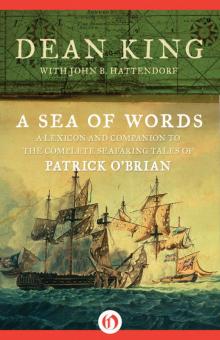 A Sea of Words
A Sea of Words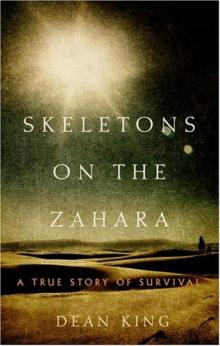 Skeletons on the Zahara
Skeletons on the Zahara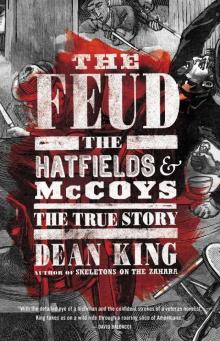 The Feud: The Hatfields and McCoys: The True Story
The Feud: The Hatfields and McCoys: The True Story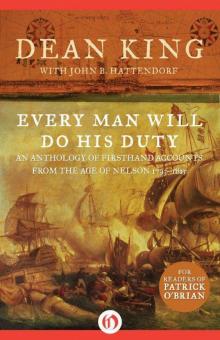 Every Man Will Do His Duty
Every Man Will Do His Duty 9/11...The Tragic Story of the Day that Changed America: The Terror, The Horror and The Heroes
9/11...The Tragic Story of the Day that Changed America: The Terror, The Horror and The Heroes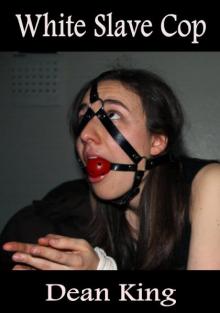 White Slave Cop
White Slave Cop Skeletons on the Zahara: A True Story of Survival
Skeletons on the Zahara: A True Story of Survival